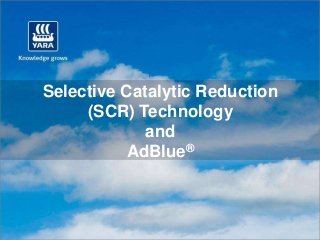
Selective Catalytic Reduction Technology (SCR) and AdBlue_air1_yara
- 1. Selective Catalytic Reduction (SCR) Technology and AdBlue®
- 2. What is SCR? Selective Catalytic Reduction (SCR) is a technology which leading European manufacturers of diesel vehicles have jointly adopted after comparing and testing a variety of available technologies aimed at reducing emission levels to the required limits. SCR is the only technology that produces the reduction of exhaust fume emissions required by legislation while allowing optimum engine operation in terms of performance and fuel consumption. SCR technology is proven to enable Heavy Diesel Vehicle engines to comply with Euro IV, V and VI. Using Air1® is the most efficient way to take full advantage of SCR technology and to meet emission regulations.
- 3. SCR works with the addition of AdBlue®, a high purity urea based fluid SCR technology reduces emissions of the NOx gases that are produced inside the engine during combustion. It works with AdBlue® that is injected in the hot exhaust gas stream just prior to the SCR unit. The AdBlue® is hydrolyzed to ammonia (NH3) and inside the SCR unit it assists in breakdown of NOx to harmless Nitrogen gas (N2) and steam (H20).
- 4. Why will SCR with AdBlue® make you save on fuel? Competing technology EGR combats NOx inside the engine by re-circulating a portion of the exhaust back through the engine’s cylinders. This requires the engine to work harder and consume more fuel. SCR process allows engines to operate at maximum efficiency, increasing fuel economy, and lowering costs. OEMs and fleets utilizing SCR have seen fuel efficiencies ranging from 4 to 11% percent in trucks equipped with SCR technology.
- 5. For further information please contact the Air1® team at: www.air1.info Air1® is a registered trademark of Yara International ASA. AdBlue® is a registered trademark of the Verband der Automobilindustrie e.V (VDA)
